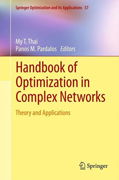
Handbook of optimization in complex networks: theory and applications
Thai, My T.
Pardalos, Panos M.
Complex Social Networks is a newly emerging (hot) topic with applications in a variety of domains, such as communication networks, engineering networks, social networks, and biological networks. In the last decade, there has been an explosive growth of research on complex real-world networks, a theme that is becoming pervasive in many disciplines, ranging from mathematics and computer science to the social and biological sciences. Optimization of complex communication networks requires a deep understanding of the interplay between the dynamics of the physical network and the information dynamics within the network. Although there are a few books addressing social networks or complex networks,none of them has specially focused on the optimization perspective of studying these networks. This book provides the basic theory of complex networks withseveral new mathematical approaches and optimization techniques to design andanalyze dynamic complex networks. A wide range of applications and optimization problems derived from research areas such as cellular and molecular chemistry, operations research, brain physiology, epidemiology, and ecology. Can serve as a source of examples and case studies for a course in networkoptimization. This is the first publication of results and articles that study complex network systems from an optimization perspective. Provides an overview of the basic theory of complex networks with several new mathematical approaches and optimization techniques to design and analyze the dynamic of complexnetworks. INDICE: Preface. 1. Optimization in Designing Complex Communication Networks (F.S.H. Souza, G.R. Mateus, A.S. Cunha). 2. Fitness-based Generative Modelsfor Power-Law Networks (K. Nguyen, D.A. Tran). 3. Double Pareto Lognormal Distributions in Complex Networks (Z. Fang, J. Wang, B. Liu, W. Gong). 4. Laplacian Spectra and Synchronization Processes on Complex Networks (J. Chen, J. Lu, C. Zhan, G. Chen). 5. Growing Networks driven by the Evolutionary Prisoner’s Dilemma Game (J. Poncela, J. Gomez-Gardenes, L.M. Floria, Y. Moreno). 6. Defining and Discovering Communities in Social Networks (S. Kelley, M. Goldberg, M. Magdon-Ismail, K. Mertsalov, A. Wallace). 7. Modularity Maximization and Tree Clustering: Novel Ways to Determine Effective Geographic Borders (D. Grady, R.Brune, C. Thiemann, F. Theis, D. Brockmann). 8. Emergence and Structure of Cybercommunities (M. Mitrovic, B. Tadic). 9. k -core Organization in Complex Networks (G.J. Baxter, S.N. Dorogovtsev, A.V. Goltsev, J.F.F. Mendes). 10. Hardness Complexity of Optimal Substructure Problems on Power-Law Graphs (Y. Shen, D.T. Nguyen, M. T. Thai). 11. Path Problems in Complex Networks (P. Ghosh, A. Sen). 12. Optimized Design of Large-scale Social Welfare Supporting Systems on Complex Networks (J. Janacek, L. Janos?kova, L. Buzna). 13. Optimal Flows in Dynamic Networks and Algorithms for Their Finding (M. Fonoberova). 14. Some Distributed Approaches to the Service Facility Location Problem in Dynamic and Complex Networks (I. Stavrakakis). 15. Modeling Epidemic Spreading in Complex Networks: Concurrency and Traffic (S. Meloni, A. Arenas, S. Gomez, J. Borge-Holthoefer, Y. Moreno). 16. Theory of citing (M.V. Simkin, V.P. Roychowdhury). 17.TTLed Random Walks for Collaborative Monitoring in Mobile and Social Networks(Y. Altshuler, S. Dolev, Y. Elovici).
- ISBN: 978-1-4614-0753-9
- Editorial: Springer New York
- Encuadernacion: Cartoné
- Páginas: 518
- Fecha Publicación: 28/11/2011
- Nº Volúmenes: 1
- Idioma: Inglés
